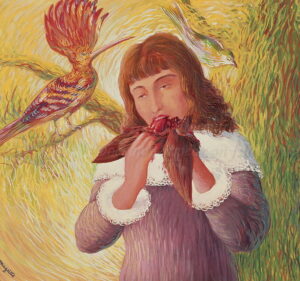Susan Orlean once described writing a book as “a slow-motion wrestling match.” I’ll add that there’s no one to tag in if your energy flags. Worse, at first you can’t even see your opponent. It’s your job to transform that amorphous cloud of images and ideas into a body you can slam to the mat.
My current wrestling match has been grinding on for a decade. It’s my third novel. The other two are on discs that can no longer be read by any modern computer.
In my first novel, The Girl Who Ate Birds, a girl grows up in what used to be called a broken home, in a house straddling the San Andreas Fault. She has an insatiable hunger for she doesn’t know what. She cleans out horse stalls for pocket money, gossips in bathroom stalls, and makes friends with a gorilla and the woman teaching him to talk. Sound whimsical? The agent I sent it to said it was too dark. I can’t remember if I tried to rewrite it or send it to another agent. I don’t think so. Looking back, I can’t believe I gave up so easily. I even had what I thought was the perfect image for the cover: the somewhat macabre Magritte illustrating this post.
The Gospel of Gone, my second novel, sets a wandering daughter on a road trip back home to the west coast, where she inherits the only kind of home she could possibly embrace: a boat. That novel won the Pirate’s Alley Faulkner Society award for best novel in manuscript. The judge that year was a writer I much admired: Oscar Hijuelos, author of Mambo Kings Play Songs of Love.
With the award came agents who pursued me–a dream come true. One invited me to a very expensive lunch, then told me she’d forgotten her wallet. Another wanted me to write in a sidekick for my solitary female protagonist. Other agents weighed in. The book didn’t sell. Winning the contest hurled my hopes into the mesosphere; confronting the fickle publishing world, I plummeted back to earth. I abandoned fiction for a good ten years.
But the girl can’t help it. Fiction started burbling up between articles and essays and editing and teaching.
What’s different about the third novel? It takes on many of the same themes as my earlier books (inheritance, loss, finding your place in your family and the larger world), then throws in Costa Rica and some fun bird and bug facts. And I think I may have finally learned how to plot and how to write in scenes.
Perhaps the biggest difference this time around is that I’ve managed to disentangle my entire identity from my writing and whether or not it does well in the world. I’m also tougher: I’ve shortened the time between getting knocked down and picking myself back up again. And I finally understand that you can’t do it alone.
As every introvert knows, so-called community can create as many problems as it solves. Hell is indeed other people, but they’re also your only shot at heaven, or at least a convivial purgatory. I’ve learned how to be a good reader, editor, and encourager. Writer friends return the favor, offering feedback on what works and what doesn’t. Beyond those mechanics, we commiserate about how hard it is, this writing life, while tacitly acknowledging that we love what we do and couldn’t stop if we tried.
We sure don’t do it for the money. An Author’s Guild survey reported that the median annual income for its members was $6,080 in 2017, and that since the pandemic began, authors report an income drop of almost 50 percent.
I set out knowing I wouldn’t make any money on my own writing, and now I’m maybe 5 cents ahead of the game. It’s about doing what you love and then getting better at it. About putting words in a pleasing order and building worlds on the page.
Writing is finally a series of permissions you give yourself to be expressive in certain ways. To leap. To fly. To fail.
–Susan Sontag
I was alone with my first two novels, or thought I was. I’m finishing my third in a time when community has exploded, including online writers groups. It’s ironic that I’ve learned some of my best lessons about community online, but in a way it makes sense: the internet amps up everything, and you see so much good and bad behavior, you figure out very soon which groups are good for you and what role you want to play in them. You also see all the talent out there; the competition can feel daunting. But if you’re trying to get better at, say, tennis, you rally with people who are better than you.
Right now I’m feeling good about this novel, this worthy adversary that might one day be counted as a friend. My expectations are lower now, but in a way, they’re also higher, in that I am committed to bringing this book into the world, whatever it takes. When I wrote my first two novels, the agent/traditional publisher route seemed like the only way to go. These days, there are many ways to do end runs around the gatekeepers, including self-publishing, which has lost much but not all of its stigma. I’ll do what I have do to get this book into print, if only to give copies to all the people who’ve read excerpts, given feedback, or listened patiently as I go on about the story, trying to find its beating heart.
I will say now to all my supportive friends and family and to the story itself: thank you. I will do right by you, I promise. It just may take a little more time.
The loneliness of the
long-distance novelist

Hell is indeed other people, but they’re also your only shot at heaven, or at least a convivial purgatory.